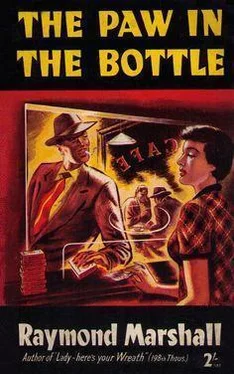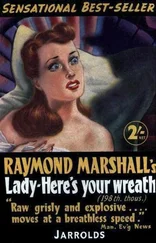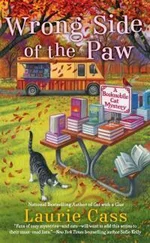‘Gripes!’ Harry exclaimed, his eyes lighting up. ‘Now you’re talking. For eight thousand...’
‘This is crazy!’ Bernstein cried. His hands fluttered over the desk like two frightened bats. ‘You can’t make such promises. You want me to take the stuff, don’t you? Well then, I make the price. You can’t say they’ll be worth this and that. I must see the stuff first.’
‘If you can’t talk figures, Syd, someone else will,’ Mrs. French said mildly. ‘You’re not the only fence who’d like to handle the Wesley’s furs.’
Theo nudged Bernstein.
‘Stuff that up your vest and see how it fits,’ he said, and laughed.
Rain splashed against the windows and ran in gurgling little rivers in the gutters. The lone policeman, walking down Mayfair Street, snug in his rainproof cape, had no idea that a robbery was being planned within a few yards of him. He wasn’t interested in robberies. He was thinking of the spring cabbages he had planted that afternoon. The rain, he reckoned, would give them a fine start.
If you happen to look for them, you will find an odd assortment of cafés, restaurants and clubs that somehow manage to conceal themselves in the jungle of brick, stone and dirty windows along King’s Street, Fulham Palace Road and Hammersmith Bridge Road. You may wonder how such derelict-looking places keep open; who amongst the teeming crowd of shoppers and loafers converging from Hammersmith Broadway are likely to go to such places for a meal. But it is only at night, and in the small hours of the morning, that these particular cafés and restaurants come to life. If you happened to be in the district after eleven o’clock, you would find them crowded with a rather sinister-looking collection of men and women who sit over their tea or coffee talking in low tones, and who glance up suspiciously whenever the door opens and relax when the newcomer is recognized.
It is to such places that the Service deserters, tired of remaining in their rat-holes, come for a quick coffee and a look round before going to the West End; where the small gangs meet to check the final details of a new haul, and where the filthiest of all the scrapings of London’s gutters — the painted youths in sandals and bright sweaters — cat before beginning their nightly prowl.
The king among these cafés and restaurants was the Bridge Cafe, owned by Sam Hewart, a dumpy, hard-faced man of indeterminable age. He had taken over the café during the height of the London blitz, and had got it cheap. Hewart believed in looking ahead, and he knew sooner or later there would be a need for such a place in such a district: a place for the wide boys to meet, to leave messages that they knew would be delivered, to get information, to be told who was in Town and who wasn’t, and who was paying the best prices at the moment for silk stockings, cigarettes, and even mink coats.
Six months ago a girl had come to Hewart’s office. Her name was Julie Holland, and she worked at a nearby twopenny library. She had heard, she told him, there was a vacancy on his staff.
‘I could be useful,’ she had said quietly. ‘I’m not fussy what I do.’
Hewart had been impressed. He liked the way her dark, shiny tresses fell in natural waves each side of her small, rather pale face. He liked her alert grey eyes, and he particularly liked her figure, which, he thought in his loose-minded way, would be sensational without clothes. He couldn’t understand how it was he hadn’t seen her before. If, as she said, she worked in the library he should have seen her. He was annoyed with himself because he hadn’t seen her. It made him feel old. He wouldn’t have missed her five years ago, he told himself. He spent nearly all his waking hours thinking about girls. They dwelt in his mind consciously and subconsciously the way death sometimes dwells in the minds of the timid; although lately he hadn’t been as preoccupied with these thoughts as he used to be, and when he was conscious of this it worried him. It was, he told himself bitterly, a sign of age.
This girl who now stood before him aroused in him an almost forgotten feeling of desire. She wore a sweater that showed off her breasts and her skirt was tight and short. There was scarcely a line of her body that he couldn’t see. Her lipstick was vivid and put on to make her mouth look square, and her lips had a soft, yielding look that made Hewart feel short of breath.
He would have been startled and annoyed had he known she had deliberately dressed herself in this way to appeal to his ageing sense of lust. An amiable young spiv had given her the tip that Hewart wanted a smart girl who could keep her mouth shut. Hewart was all right, the spiv had told her, if she didn’t mind being pawed occasionally.
‘He’s getting old,’ the spiv had said, with a cynicism that appealed to Julie. ‘You know what old men are like. It’s all handy-pandy stuff; nothing you couldn’t handle.’
As for the café... well, she didn’t have to be told what some of the cafés were like in that district, and the Bridge Cafe was no exception, but the money Hewart paid was good. That was the point. The money was excellent. ‘He’ll pay six quid, maybe more, and if you let him pinch your leg occasionally, you might screw him up to seven.’
Seven pounds a week! At that time such a sum was the pinnacle of Julie’s ambition. She made up her mind to get the job. What did she care if Hewart were tiresome? She was used to that sort of thing by now. Seven pounds a week! It was a fortune.
Julie was twenty-two years of age. Twenty of these years had been milestones of bitter poverty, of pinching and scraping and making do. Her parents had been miserably poor, her home squalid and dirty, and she had been continually hungry. As long as she could remember she had had a desperate, trapped feeling that life was slipping away from her, and she was missing all the good things that would have been hers had she the money to buy them. It was hunger that formed her character. It was hunger that sharpened her wits, and made her sly and cunning. Hunger and envy; for envy tormented her, making her a morose and unsociable child, and later a shrewd, hard, calculating young woman.
As soon as she was old enough to discriminate between those who have and those who have not, envy had laid hold of her. She envied people with clean homes, good clothes, cars, and the blind beggar who stood at the corner of her street when people gave him money. She envied the other children at school if they were better dressed than she. She pestered her parents for more to eat, for pocket money, for better clothes until, exasperated by his inability to give her what she wanted, her father flogged her to silence. But the flogging didn’t cure her of envy. She was determined to have the good things of life, and since her parents failed to provide them, she began to help herself. At first she took only small things: a bar of chocolate from a classmate; a bun, sneaked off the baker’s counter; a hair ribbon from her sister; a wooden peg-top from the boy next door. She took with cunning and no one suspected her. But the more she took, the more she wanted, and to celebrate her twelfth birthday she raided the jewellery counter in Woolworth’s. But this time she wasn’t dealing with children, and she was caught.
The magistrate had been lenient. He understood children, and when he had read the report on Julie’s home life, he called her to him. She was too frightened to remember all he said to her, but she did remember the fable of the monkey and the bottle he had selected as the corner stone for his sermon.
‘Have you ever heard how they catch monkeys in Brazil, Julie?’ he had asked, to her surprise. ‘Let me tell you. They put a nut in a bottle, and tie the bottle to a tree. The monkey grasps the nut, but the neck of the bottle is too narrow for the monkey to withdraw its paw and the nut. You would think the monkey would let go of the nut and escape, wouldn’t you? But it never does. It is so greedy it never releases the nut and is always captured. Remember that story, Julie. Greed is a dangerous thing. If you give way to it, sooner or later you will be caught.’
Читать дальше











